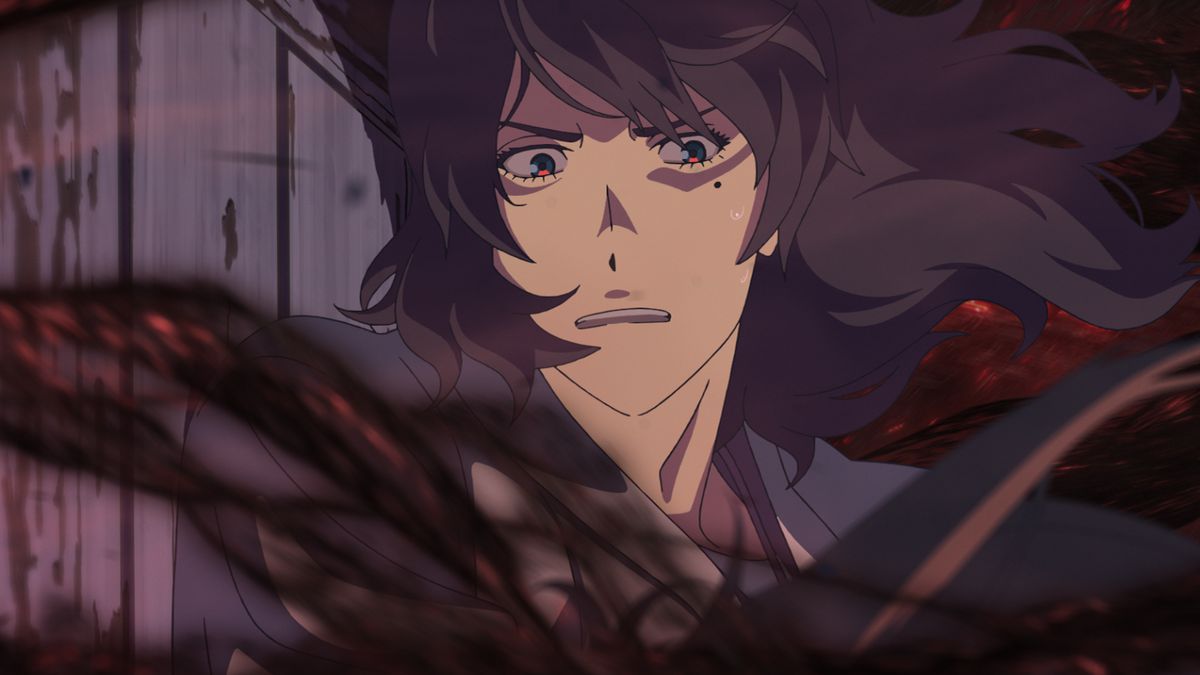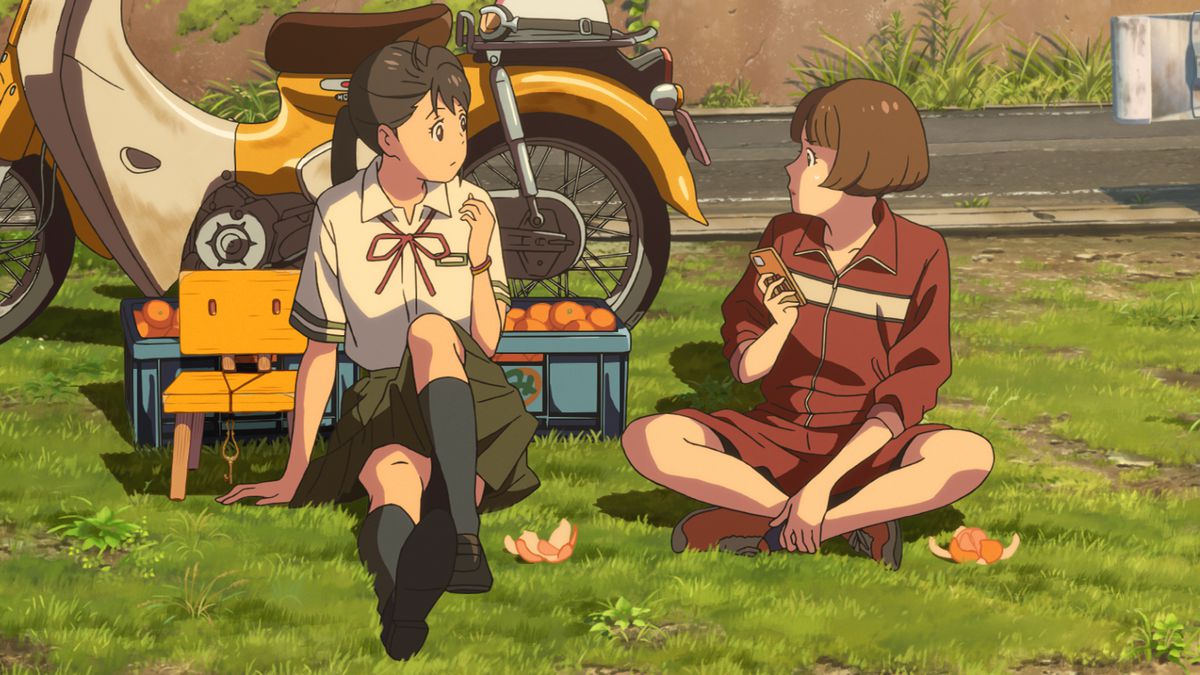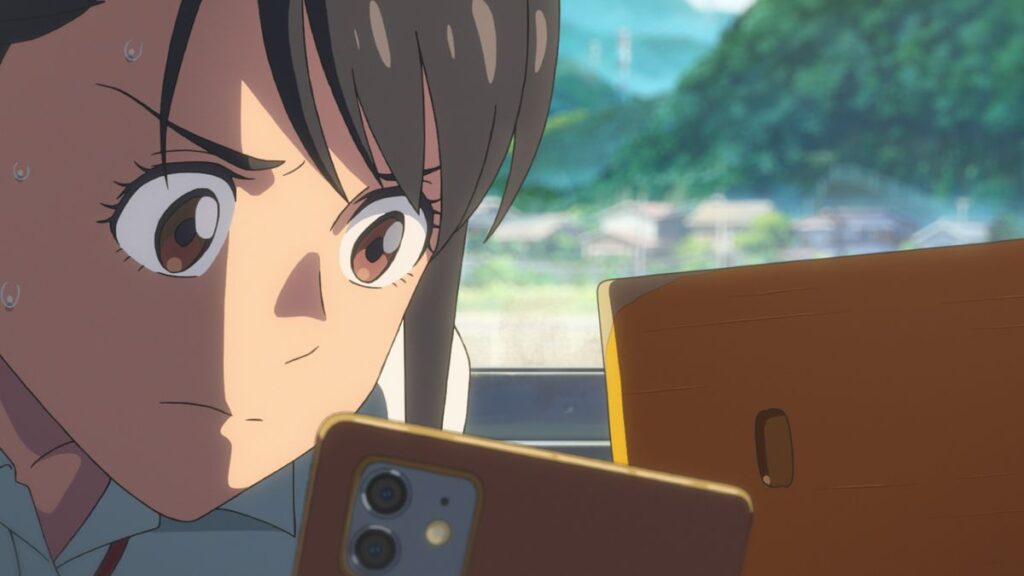2016’s Your Name wasn’t the first project from director Makoto Shinkai, but it was his first huge success, becoming the third highest-grossing anime film internationally and establishing him as a worldwide name. It also solidified certain expectations for Shinkai’s future work: Since Your Name was such an evocative romance, fans anticipated more of the same from him.
His 2019 feature Weathering With You gave them exactly what they expected: another fraught relationship drama between young people with a supernatural element. So naturally, when the first trailers for Suzume came out, many fans expected another magically tinged romance. After all, the titular heroine meets a mysterious, handsome stranger, and they’re thrown together by intense magical conflict. Never mind that her dashing new companion turns into a chair early in the movie; the pieces all still seem to be there.
This time around, however, Shinkai was less interested in writing a love story. Instead, he wanted to focus on a variety of different relationships.
But by shifting the focus away from romance, he made Suzume’s romance absolutely incredible. Unlike in Weathering With You and Your Name, Suzume’s romantic arc is more understated, and less of the movie’s driving force. And yet, because the romance takes a back seat in favor of the main character’s growth, with the primary climax focused inward, Suzume ends up with a particularly unique and beautiful romantic arc.
[Ed. note: This post contains setup spoilers for Suzume.]
Image: CoMix Wave Films/Crunchyroll
Like Weathering With You and Your Name, Suzume is about two young people caught up in a supernatural adventure. (And once again, one of them comes from a small town, while the other is a city slicker.) In this case, Suzume, the protagonist, meets the enigmatic Sōta after he asks her if there are any abandoned places nearby. She learns that Sōta is on a mission to close doors between worlds, to contain a giant supernatural worm (a staple in Japanese mythology) that threatens to cause natural disasters. But when she follows Sōta to a dilapidated hot spring, she accidentally sabotages his mission, and he becomes a chair. Suzume and chair-Sōta trek across Japan together, closing doors and containing the worm all the way to Tokyo.
While Suzume’s journey kicks off when she meets Sōta, the movie isn’t solely about the sparks between them: It’s more about how Suzume connects with everyone around her, and how that ties into her growth as a person.
Early in the movie, it becomes evident that while Suzume seems like a typical high school student, there’s something more to her, something that seems slightly out of place. It could be her willingness to throw aside everything to follow Sōta’s mission, or the fact that she seems to have trouble connecting with the people around her. It’s subtle at first, but it comes to a head as she helps Sōta close one of the mysterious doors, and they face the powerful worm creature together. Sōta, who has trained his whole life for this duty, questions why Suzume is risking her life for his cause.

Image: CoMix Wave Films/Crunchyroll
Her response explains a lot about her character — why she’s so willing to throw herself into danger, why she’s independent to a fault, why she’s so disconnected from the people around her. The reasoning behind that response is rooted in the traumatic events she experienced as a young girl, during the 2011 Tōhoku earthquake and tsunami. Once we realize that, the story shifts from Suzume risking her life for a mission she just learned about (and a cool guy she just met) and turns into Suzume processing her trauma and trying to exert some semblance of control over these catastrophic natural disasters.
In another movie, Suzume’s dedication to her mission could easily lend itself to single-minded obsession and self-destruction. Instead, her cross-country journey slowly but surely prompts her to open up to people. Her relationship with Sōta is vital to this change, but more importantly, she encounters and accepts help from a wide range of people on her journey.
Suzume is about processing trauma and finally learning to live. Even after the movie’s turning point, Suzume is still recklessly throwing herself into danger to save others. Like Your Name and Weathering With You, Shinkai’s latest sees its young heroes racing against time to stop an impending disaster. But some key differences in Suzume make the final act cinch together in a way that soars above the previous two movies. Suzume has a personal connection to the looming catastrophe, one that snugly wraps around her entire character journey. The event itself feels vast and all-encompassing, but because the movie focuses on her instead of on the action, it gives the payoff more emotional impact. And when Suzume steps up to fight her battles, it’s less about making a dramatic choice or defying all odds. She simply reframes what she’s trying to do in a way that feels more personal than most action heroes’ journeys. She doesn’t want to give her life to save the world; she just wants to stay in it.

Image: CoMix Wave Films/Crunchyroll
Sōta inspires Suzume to live, but not for him, and not for love. He inspires her to live because he wants to live, which makes her realize she’s worth a life as well. He changes her for the better by inspiring her, without actually being the sole reason she changes. Because the movie focuses so much on Suzume as a character, we get an idea of who she is, what she wants, and how she changes. Sōta is just a smaller part of her bigger journey, which makes their relationship richer and more fulfilling.
Romantic relationships are not the sole driving force in life, after all, and knowing that Suzume’s relationship with Sōta isn’t the only significant facet of her life actually makes a future for them more likely. The movie leaves them both with their own meaningful stories, which doesn’t detract from their deep connection. If anything, their relationship resonates more because it isn’t the center of their lives or their story.
That’s far from the bittersweet ending of Your Name, where the supernatural connection between the young lovers fades away, or the powerful choice in Weathering With You, where the protagonists choose each other over a dying world. Suzume’s romantic threads are subtler, and left more up to the audience’s interpretation. But Shinkai’s refusal to spell out every step of their connection makes it feel like a more mature relationship, one where the two parties have more of an idea about who they are as people, and what they’ve done for each other. Without the traditional movie-clinching kiss or love confession to give viewers their big, obvious cathartic love-story moment, the relationship feels more natural — which grounds Suzume’s more fantastical bits as well.
Suzume debuts in theaters on April 14.

